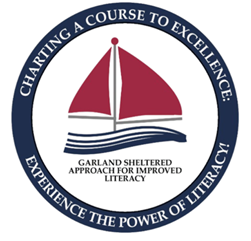Garland ISD is piloting an innovative literacy program to improve reading outcomes for early childhood students at Williams, Shugart, Freeman and Handley Elementary Schools.
Garland ISD is piloting an innovative literacy program to improve reading outcomes for early childhood students at Williams, Shugart, Freeman, and Handley Elementary Schools. The initiative, SAIL (Sheltered Approach for Improved Literacy), aims to boost academic and linguistic development for pre-K through third-grade students.
SAIL addresses the linguistic challenges early childhood students face, particularly those from low socioeconomic backgrounds. Children from low socioeconomic backgrounds start school having experienced 30 million fewer words than their more affluent peers, highlighting the need for effective and innovative programming like SAIL.
“We’ve identified gaps nationwide and statewide in literacy, and our third graders are not where we want them to be in reading on grade level,” Simone Burnett, SAIL Program Developer, explained. “The SAIL program allows us to tailor how we instruct our students in ways that elevate their academic language and rigor.”
The program aims to eliminate linguistic and academic gaps with interactive learning experiences and personalized support while fostering essential academic language skills for reading success. A key component of SAIL is intentional parent and family involvement, reflecting the district’s commitment to maintaining high expectations for every learner. SAIL plans to offer workshops, instructional materials, and community resources to actively engage parents in their children’s education.
SAIL focuses on four components:
- Sheltered Instruction: Provides structured support for language development, especially for students who struggle with academic language.
- Early Learning: Focuses on foundational skills crucial to early literacy.
- Multi-Tiered System of Support (MTSS): Delivers personalized interventions based on student needs.
- Science of Reading: Applies evidence-based practices to enhance reading instruction.
The program collaborates with community organizations, including the Garland ISD Council PTA, NAACP, Atmos Energy, and Scholastic, to enhance its reach and impact. The collaboration will leverage local expertise, resources, and support systems to create a comprehensive approach to literacy achievement.
The partnerships contribute:
- At-home instructional materials and necessary supplies
- Parent and family learning workshops
- Student and teacher mentorship
- Student tutoring
- Teacher and administrator appreciation
- Classroom instructional resources
The program integrates the district’s curriculum with specialized sheltered instruction strategies, initially designed for bilingual settings and now adapted for monolingual classrooms. SAIL targets monolingual classrooms where academic language difficulties contribute to literacy gaps. These gaps are often noticeable by third grade and continue through later educational stages. By addressing this issue at its roots, GISD aims to reverse this trend.
With only 35% of fourth graders nationwide reading at a proficient level and the added challenge of a significant socioeconomic achievement gap, SAIL is essential for bridging these gaps.
This initiative is unique to GISD and showcases the district’s dedication to innovative, research-based educational strategies. With its proven success, the SAIL program—currently at four campuses—is expected to expand to other campuses and grade levels.
Information and photo provided by Garland ISD.


